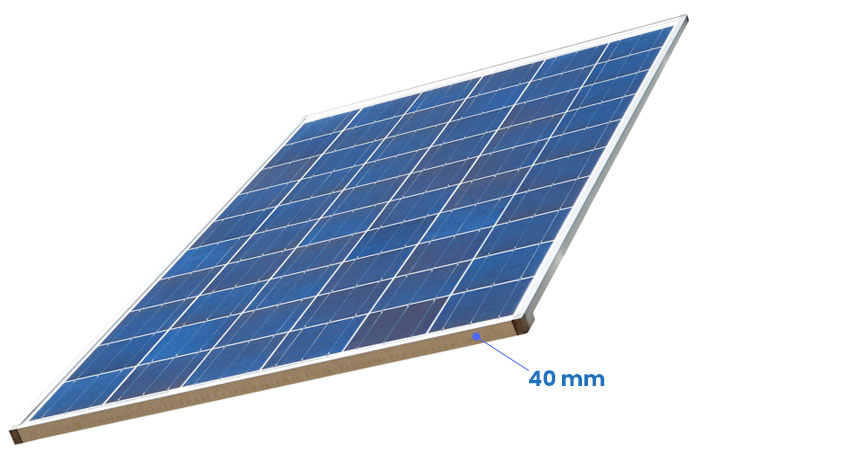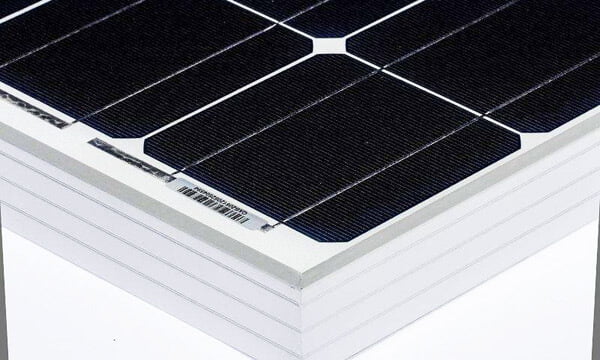Solar panels are a key component in solar power systems, and the thickness of the panels is an important factor in determining the overall efficiency of the system. The thickness of solar panels is typically measured in millimeters, and the average panel is between 3 and 4 mm thick. However, there are a few panels on the market that are as thin as 1.5 mm, and these panels are typically more expensive.
If you’re shopping for solar panels, you may notice that they come in a variety of thicknesses. So, what’s the difference?
Generally speaking, the thicker the panel, the more efficient it will be.
That’s because thicker panels have more room for the solar cells that actually do the work of converting sunlight into electricity.
However, efficiency isn’t the only consideration when choosing solar panels. Thickness also affects the durability of the panel and how well it will withstand the elements.
Thicker panels are usually more durable, but they also tend to be more expensive.
So, which thickness is right for you? It depends on your budget and your needs.
If you’re looking for the most efficient panels possible, go for the thicker ones. But if you’re on a tight budget, you can still find good quality panels in a thinner size.
Monocrystalline Vs. Polycrystalline solar panels: A Clear and Simple Comparison
How Thick is the Average Solar Panel?
Solar panels are typically about 1/4 inch thick, but they can vary in thickness from 1/8 inch to 1 inch. The average solar panel is about 3 feet by 5 feet, and it weighs about 40 pounds.
How Thick is the Glass on a Solar Panel?
Solar panels are made from a thin layer of silicon, which is a semiconductor. The thickness of the silicon layer is usually around 180 micrometers, which is about the thickness of a human hair. The silicon is then coated with a thin layer of glass, which is typically around 3-4 micrometers thick.
The glass protects the silicon from the environment and helps to keep the silicon clean.
How Thick is a Small Solar Panel?
A small solar panel typically has a thickness of about 3.2mm, give or take a few tenths of a millimeter. Solar cells are generally the thickest component of a solar panel, and their thickness can vary from about 200 micrometers (0.2mm) to 400 micrometers (0.4mm). The other main component of a solar panel is the glass cover, which has a typical thickness of 3mm.
So, all in all, a small solar panel typically has a thickness of about 6.2mm.
How Thin is a Solar Panel?
Solar panels are typically around 4mm thick, though this can vary depending on the type of panel and the manufacturer. The average thickness of a solar panel is around 200 microns, or 0.2mm. However, some panels can be as thin as 50 microns, or 0.05mm.
The thinnest solar panels currently available are around 10 microns, or 0.01mm.

Credit: designingidea.com
Thickness of Solar Panel in Mm
When it comes to solar panels, thickness can vary quite a bit. The average solar panel is around 3.5 mm thick, but they can range from 2 mm to 5 mm. The thickness of a solar panel has a direct impact on its efficiency.
The thicker the panel, the more light it can capture and convert into energy. However, thicker panels are also more expensive and can be more difficult to install.
The average home solar panel is around 250 watts, which is about 1 square meter in size.
If you want to generate more power, you can install multiple panels or choose a thicker panel. For example, a 300-watt panel is about 1.5 square meters in size and a 400-watt panel is about 2 square meters.
If you’re looking to save money, you can choose a thinner solar panel.
A 2 mm panel is about half the price of a 3.5 mm panel, and a 3 mm panel is about 30% cheaper. However, you’ll need to install more panels to generate the same amount of power.
When it comes to solar panels, thickness is an important factor to consider.
The thicker the panel, the more efficient it is, but thicker panels are also more expensive. If you’re looking to save money, you can choose a thinner panel, but you’ll need to install more panels to generate the same amount of power.
Solar Panel Dimensions Cm
If you’re considering solar panels for your home, you may be wondering what the standard solar panel dimensions are. Solar panels are typically either 60 or 72 cell panels, and they come in a variety of sizes. The most common solar panel size is approximately 1.6m x 1m, but they can range from 1.2m x 0.6m to 2.4m x 1.2m.
The number of cells in a solar panel dictates the overall size of the panel. A 60 cell panel is typically about 1m x 1.6m, while a 72 cell panel is typically 1.2m x 1.8m. The number of cells also affects the power output of the panel.
A 60 cell panel typically produces about 250-270 watts, while a 72 cell panel typically produces about 300-325 watts.
The size of your solar panels will also dictate the number of panels you’ll need to install to meet your energy needs. If you have a small roof, you may only be able to install a few panels.
If you have a large roof, you may be able to install several panels.
Solar panel dimensions are an important consideration when selecting solar panels for your home. Be sure to select a size that will fit your roof and that will produce the amount of power you need.
Size of Solar Panel for 1Kw
As the world progresses, more and more people are looking for ways to save money and be more environmentally friendly. Solar panels are a great way to do both of those things. If you’re thinking of getting solar panels for your home, you may be wondering how big of a solar panel you need to generate 1 kilowatt (kW) of power.
The answer to that question depends on a few factors, including the efficiency of the solar panel and the amount of sunlight the panel will receive. On average, you’ll need between 20 and 30 square feet of solar panel to generate 1 kW of power.
If you’re unsure of how big of a solar panel you need for your home, you can always consult with a solar panel expert.
They can help you determine the size and number of panels you need to reach your energy goals.
Conclusion
Solar panels are typically around 3/16 of an inch thick, but they can be as thin as 1/8 of an inch. The thicker the panel, the more durable it is, but the thinner panels are more efficient.
